|
|
|
Sort Order |
|
|
|
Items / Page
|
|
|
|
|
|
|
| Srl | Item |
| 1 |
ID:
179569
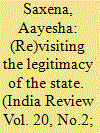

|
|
|
|
|
| Summary/Abstract |
The spread of the novel coronavirus that took over the world by a storm has caused a serious rupture in the social and economic order. As the Indian state is confronted by several challenges, the exodus of migrant labor appears as a gruesome spectacle. The already precarious lives of migrant labor owing to their employment in the informal economy has been amplified manifold with the outbreak of the pandemic. The eclipsed response of the state to acknowledge their misery has further exacerbated the problem. Since the state is entrusted with the responsibility of providing social security to the labor in the informal economy- a component that is also deemed necessary to be fulfilled by those the state seeks to govern, the pandemic has rendered the question of state’s legitimacy to be probed further. Defined as the capacity and the right to rule, the legitimacy of the state is analyzed from the perspective of the effective provision of social security schemes as well as the expedition/suspension of labor rights. While the state may possess the capacity to provide for social security, and it certainly does as is evident from its boisterous declarations of fiscal stimulus’ for labor welfare, it is argued that the state’s blatant lack of willingness to translate its promises into concrete action puts the “right to rule” aspect under scrutiny and its legitimacy under jeopardy.
|
|
|
|
|
|
|
|
|
|
|
|
|
|
|
|
| 2 |
ID:
175772
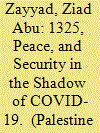

|
|
|
|
|
| Summary/Abstract |
While the year 2020 was heading toward its end, we at the Palestine-Israel Journal were heading toward closing our last issue for this year, which is devoted to United Nations Security Council Resolution 1325 on women, peace, and security. With wonderful, outstanding women from academia and the public sector, we believe we have produced an excellent issue. We believe that it will serve as an impressive resource on this resolution not only for Palestine and Israel but the whole world. Because of the global importance of the subject, we were careful to include a wide spectrum of contributions from the region and abroad. This issue was made possible by the generous support of the Foreign Ministry of the Federal Republic of Germany, and for that we express our gratitude and thanks. This is not the first time that we have collaborated with the German government, and we hope it will not be the last.
|
|
|
|
|
|
|
|
|
|
|
|
|
|
|
|
| 3 |
ID:
193764


|
|
|
|
|
| Summary/Abstract |
Using two waves of surveys (2019 and 2021) among Chinese economists with support from the Chinese Economists Society (CES), we capture a current profile of Chinese academic economists on their demographics, education, academic rank, wage, time use, research interests, and productivity. Our data reveal many similarities among those employed in China and overseas, with statistically significant differences in pay and teaching load. More profound disparities lie in gender comparisons, with findings echoing the recent trend in the overall economics profession, including career advancement challenges for women and lower pay for female economists, among others. Finally, this paper investigates the impact of the COVID-19 pandemic on Chinese economists. Comparing their time allocation with that before the pandemic suggests male economists with children were able to spend slightly more time per workday on research and leisure during the pandemic. On the contrary, female economists with children reduced time for research to cope with the increased demand for childcare.
|
|
|
|
|
|
|
|
|
|
|
|
|
|
|
|
| 4 |
ID:
185660
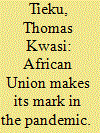

|
|
|
|
|
| Summary/Abstract |
A new spirit of pan-Africanism guided the continent’s response to the pandemic. Led by South African President Cyril Ramaphosa, the African Union provided multilateral coordination and worked with external partners to obtain support, while the Africa Centres for Disease Control and Prevention organized the pandemic responses of national public health agencies. The pandemic showed the risks of continued reliance on foreign donors for resources such as vaccines, but the collective response demonstrated that the AU has become a strong institution capable of addressing regional and global challenges.
|
|
|
|
|
|
|
|
|
|
|
|
|
|
|
|
| 5 |
ID:
173175


|
|
|
|
|
| Summary/Abstract |
In this article, we reflect on critical questions relating to the future of African migration to China in the post-COVID-19 world at the backdrop of the mistreatment many Africans received as part of the pandemic control in China. These questions include: Is this the end of African migration to China as we know it? Will COVID-19 fundamentally change how we think about migration, mobility and wellbeing in the People’s Republic of China (PRC)? What will be the effect of the post-COVID-19 regime on the social identity and wellbeing of the African diaspora in Guangzhou and other Chinese cities?
|
|
|
|
|
|
|
|
|
|
|
|
|
|
|
|
| 6 |
ID:
182856
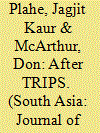

|
|
|
|
|
| Summary/Abstract |
India has long played a key role in supplying low-cost pharmaceuticals to people in developing countries, gaining a reputation as ‘the pharmacy of the developing world’. Yet, changes to India’s intellectual property regime under the World Trade Organization’s 1995 Trade Related Aspects of Intellectual Property Rights (TRIPS) Agreement mean that India’s capacity to produce and supply affordable medicines has been undermined. We use a political economy approach to investigate the factors that are determining the future of Indian generic pharmaceutical companies as suppliers of affordable medicines in the ‘post-TRIPS’ environment. We argue that while there is some scope within this environment for legal safeguards to protect access to life-saving medicines, the future of the ‘pharmacy of the developing world’ is in question, not just because of the ownership rights awarded to multinational corporations (MNCs) under the TRIPS framework, but also because of the way the market system is tilted towards MNCs. MNCs can ‘play’ the system locally and across the world, including by exerting pressure on safeguards that India instituted to protect the affordability of medicines. Against this background, we explore the challenges faced by the Indian government in creating an environment that is more likely to ensure access to life-saving medicines.
|
|
|
|
|
|
|
|
|
|
|
|
|
|
|
|
| 7 |
ID:
182937


|
|
|
|
|
| Summary/Abstract |
Many countries in the global South have rapidly aging populations. The COVID-19 pandemic has been especially hard on older adults in these countries, who mainly depend on kin for care. The pandemic has shown that a recommitment to public investment in their well-being is needed.
|
|
|
|
|
|
|
|
|
|
|
|
|
|
|
|
| 8 |
ID:
197048


|
|
|
|
|
| Summary/Abstract |
The study examines the impact of Covid-19-induced economic stressors (such as incomes and job losses) on household alcohol consumption in India. Our analysis, based on eight waves of the Centre for Monitoring Indian Economy–Consumer Pyramids Household Survey (CMIE-CPHS) for the period January 2019–August 2021, confirms an increased consumption of alcohol during the pandemic despite supply restrictions imposed by the state. A spurt was witnessed across socioeconomic groups with varying intensities. This confirms the self-medication hypothesis and stress-response-dampening theory that households responded to the pandemic-related economic and psychological shocks by increasing the consumption of alcohol and is more significant for the poor and the marginalised.
|
|
|
|
|
|
|
|
|
|
|
|
|
|
|
|
| 9 |
ID:
172970
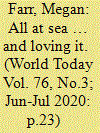

|
|
|
|
|
| Summary/Abstract |
Like everyone else on the planet, we tuned in to news channels, followed tweets, commented on Facebook posts, read articles and shared opinions as we watched COVID-19 roll across the world.
|
|
|
|
|
|
|
|
|
|
|
|
|
|
|
|
| 10 |
ID:
189992
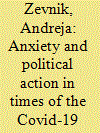

|
|
|
|
|
| Summary/Abstract |
Since the beginning of the global Covid-19 pandemic in the spring of 2020 countries across the world have implemented various measures to contain the virus. They have restricted public gatherings, mobility and congregation of people at homes and in public places. These restrictions however did not stop another chain of events – the global Black Lives Matter (BLM) protests. In the summer of 2020 people across the globe mobilised to protest the police killing of George Floyd. In the UK the protest for Black Lives took place in all major cities, but they also continued weekly in smaller communities by ‘taking the knee’. What interests me in this contribution is how anxieties experienced during the global pandemic contributed to the mobilisation of large-scale political actions for racial justice and how might we consider anxiety as a mobilising force in political space in times of global pandemic in particular in the context of anti-racist protests such as BLM. This forum contribution opens by considering how global pandemic aided conditions for political action for racial justice, before discussing the role of anxiety in political mobilising. Here I first detailed how anxiety is understood in Lacanian psychoanalysis before considering what it tells us about the BLM protests for racial justice and specifically the removal of the Colston statue during the Bristol protest on June 7 2020.
|
|
|
|
|
|
|
|
|
|
|
|
|
|
|
|
| 11 |
ID:
186600
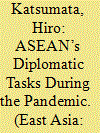

|
|
|
|
|
| Summary/Abstract |
What are the implications of COVID-19 for the diplomacy of the Association of Southeast Asian Nations (ASEAN)? What kinds of diplomatic tasks has the pandemic imposed on ASEAN, and in what way has the Southeast Asian association handled them? ASEAN’s most fundamental diplomatic task has of course been to continue building ASEAN communities, but the ability of the association of minor powers in Southeast Asia is limited. Hence, it can be said that ASEAN’s most important diplomatic task has been to maintain favorable relations with external powers, in particular, with China and the United States. The present study argues that ASEAN has managed to maintain favorable relations with and receive support from both of these external powers by conducting “equidistant diplomacy” with them. In concrete terms, it has fostered favorable relations with China. Yet, without relying excessively on Beijing, it made sure to foster such relations with the United States as well, thereby striking a reasonable balance between these two external powers.
|
|
|
|
|
|
|
|
|
|
|
|
|
|
|
|
| 12 |
ID:
173729
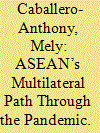

|
|
|
|
|
| Summary/Abstract |
A tradition of multilateral cooperation among the member states of the Association of Southeast Asian Nations (ASEAN) has helped the region effectively respond to the coronavirus pandemic and curtail its spread, after early missteps by some governments. While some nations elsewhere have turned inward and have struggled to cope, ASEAN members were able to mobilize regional mechanisms to coordinate a response. ASEAN has demonstrated the advantages of a rules-based regional order capable of addressing a nontraditional threat to security.
|
|
|
|
|
|
|
|
|
|
|
|
|
|
|
|
| 13 |
ID:
174229
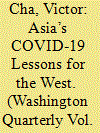

|
|
|
|
|
| Summary/Abstract |
Epidemiologists universally acknowledge that communities in Asia including in Hong Kong, Singapore, South Korea, Taiwan, and Vietnam have been more successful than the United States and most European countries in “flattening the curve” and limiting the spread of the COVID-19 virus among its populations. Despite the relative proximity of human-to-human transmission with China, the total number of cases and deaths as of May 2020 for these five countries is unusually small compared to the United States, Italy, and other European states. South Korea discovered its first positive case within one day of the United States but slowed the infection rate by the end of February. The United States, by contrast, exceeded 1.1 million cases and was still on the incline in late April. Singapore has demonstrated the lowest mortality rate for the virus and succeeded in initially suppressing infection rates with quarantines and social distancing. And all these Asian societies have managed to maintain some degree of normalcy and economic well-being compared with the lockdown and economic freefall in the United States.
|
|
|
|
|
|
|
|
|
|
|
|
|
|
|
|
| 14 |
ID:
192341
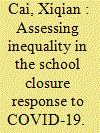

|
|
|
|
|
| Summary/Abstract |
The spread of coronavirus disease 2019 (COVID-19) has caused school closures in most countries, affecting over 90% of the world's student population. School closures can widen learning inequalities and disproportionately hurt vulnerable students. We collected data on the exam scores of university applicants in China before and after a two-month period of school closure. We observe that students from rural, lower-income households are more negatively affected by school closures compared to their urban, higher-income counterparts. The inequality effect remains sizable in the admission exam three months after schools reopen. To strengthen the causal interpretation of the results, we investigate the scores in the previous graduating cohorts who did not experience school closure, and find no evidence of the change in scores over the same calendar period. Our study points to the urgent need to address the educational inequality caused by school closures.
|
|
|
|
|
|
|
|
|
|
|
|
|
|
|
|
| 15 |
ID:
191955


|
|
|
|
|
| Summary/Abstract |
This paper offers a multi-dimensional analysis of the ways and extent to which the US president and UK prime minister have securitized the Covid-19 pandemic in their public speeches. This assessment rests on, and illustrates the merits of, both an overdue theoretical consolidation of Securitization Theory’s (ST) conceptualization of securitizing language, and a new methodological blueprint for the study of ‘securitizing semantic repertoire’. Comparing and contrasting the two leaders’ respective securitizing semantic repertoires adopted in the early months of the coronavirus outbreak shows that securitizing language, while very limited, has been more intense in the UK, whose repertoire was structured by a biopolitical imperative to ‘save lives’ in contrast to the US repertoire centred on the ‘war’ metaphor.
|
|
|
|
|
|
|
|
|
|
|
|
|
|
|
|
| 16 |
ID:
181939
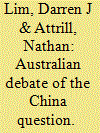

|
|
|
|
|
| Summary/Abstract |
Debate within Australia regarding the bilateral relationship with China is complex, contentious and often lacks clarity. Informed by basic international relations theory, we identify two dividing lines within this debate. First, whether understanding China’s behaviour is most effectively done through a unitary actor framework, or whether it is essential to look inside the ‘black box’ of the Chinese party-state. Second, whether one is more concerned about the ‘Thucydides trap’ or ‘Munich’—that is, are the consequences of an overreaction or an underreaction more concerning when interpreting China’s intentions and responding to perceived threats. These dividing lines generate four ideal-type policy viewpoints that we label Balancers, Hedgers, Engagers and Reformers, and apply in the Australian context. We then overlay our framework onto the public debate in Australia, selecting a specific bounded case study: commentary and analysis concerning China’s behaviour throughout the COVID-19 pandemic of 2020, in particular responding to Australia’s call for an international inquiry. Our objective is to progress an often circular debate by offering an accessible frame that clarifies and synthesises fundamental disagreements.
|
|
|
|
|
|
|
|
|
|
|
|
|
|
|
|
| 17 |
ID:
192342
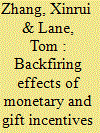

|
|
|
|
|
| Summary/Abstract |
We provide evidence that material inducements for Covid-19 vaccination may backfire. Results from a hypothetical survey experiment in China (N = 1365) show incentives of 8–125 USD reduce vaccine uptake intentions compared to simply offering vaccination for free. Ours is the first Covid-19 vaccine study to separately consider and directly compare the effects of monetary and goods-based incentives, both of which have been widely employed by countries seeking to increase uptake; we demonstrate that both types backfire equally. Results are compared against the burgeoning literature on Covid-19 vaccine incentives.
|
|
|
|
|
|
|
|
|
|
|
|
|
|
|
|
| 18 |
ID:
177779
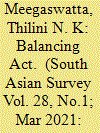

|
|
|
|
|
| Summary/Abstract |
The global spread of the COVID-19 pandemic has had a devastating impact on women: female care workers are at the forefront of the crisis and are facing increased health risks; women are disproportionately affected by the employment drop related to COVID-19 lockdowns and social distancing measures; they are exposed to an alarming increase in domestic violence and are shouldering heavier burdens at home in times of restricted movement. In other words, the COVID-19 pandemic has exacerbated existing gender inequalities and vulnerabilities. While available reports and research crystallise the challenges faced by other vulnerable groups in general, there is a lack of insights to the unique challenges faced by formally employed women while negotiating the dynamics of home during full lockdowns. This lacuna is especially applicable to the Global South, given that the overwhelming majority of available research focuses on Western societies. In this backdrop, this article explores how formally employed women navigated the COVID-19 lockdown in Sri Lanka. A feminist reading of data gathered through a structured online questionnaire from 50 formally employed women as well as 15 men for the purpose of a comparative analysis sheds light on how far and in what ways employed women were able to balance their professional and personal commitments in a time of increased uncertainty and anxiety, while adopting new practices and deploying new skills. The article concludes that in spite of gendered expectations and challenges, employed women have been able to straddle both professional and domestic duties largely due to the unique resources available to them within the South Asian household. In addition, the article observes that the COVID-19 lockdown in Sri Lanka has opened up new spaces and practices that encourage both employers and employees to enable the better reconciliation of personal and professional spheres.
|
|
|
|
|
|
|
|
|
|
|
|
|
|
|
|
| 19 |
ID:
194781


|
|
|
|
|
| Summary/Abstract |
The COVID-19 pandemic has forced militaries worldwide to join the fight. Numerous (e.g., British or Czech) armed forces seized the opportunity to propagate their domestic pandemic mitigation activities to improve their public image. However, defense budgets are usually cut first in times of crisis. Such cuts, or the mere threat of them, can have severe strategic and national security ramifications. This research, both exploratory and explanatory, investigates how military crisis-relief activities and their online propagation can muster public support against austerity cuts. It employs mixed-methods analyses of more than 160,000 posts and comments from the Czech Army’s Facebook page case study from January 2011 to January 2021. The study concludes that the Army’s propagation of information about its participation in pandemic mitigation induced positive feelings significantly more than the other content. Moreover, despite unpopular measures (e.g., lockdowns and policing), the Army’s efforts mobilized online public opposition to the austerity cuts.
|
|
|
|
|
|
|
|
|
|
|
|
|
|
|
|
| 20 |
ID:
180047
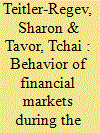

|
|
|
|
|
| Summary/Abstract |
COVID-19 pandemic created a health emergency that led to a huge global economic crisis. This article examines the effects of a wide range of variables including the number of infections, deaths, and recoveries, as well as categorical variables like public behaviour and government restrictions on stock indexes on 16 different countries. It compares the situation in Israel with the other explored countries. The regression analysis revealed that while in Israel all the variables affected stock-index returns, in the other countries only a few of the variables did so.
|
|
|
|
|
|
|
|
|
|
|
|
|
|
|
|
|
|
|
|
|